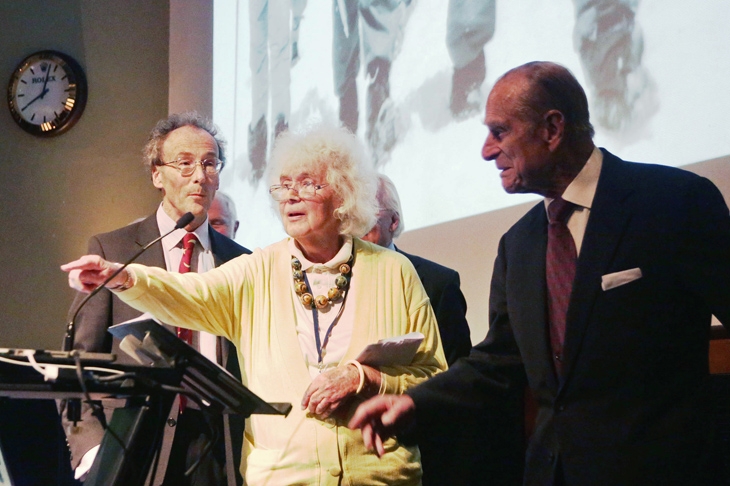It’s been a heavyweight week on Radio 4 with the start of the annual series of Reith Lectures and a talk on empire by Jan Morris, and thank heavens for that. We need serious, we need facts, we need to think in these trying times, beset as they are by Love Island and persistent presidential tweeting. As it happens, both talks were given by women, and I can’t help wondering whether their gender has something to do with the way neither of them plugged a definite line but instead suggested there are more ways than one of looking at things.
On Wednesday morning Morris looked back at Britain’s imperial past in her own inimitable fashion, calling her programme The British Empire: An Equivocation (produced by Gareth Jones). It was as curious a half-hour as the title suggests, part-documentary, part-reminiscence, and almost like a Desert Island Discs of empire, with a selection of music inspired by Mandalay, Shalimar, and the imperial project. Snatches of Elgar, Walton and Vera Lynn were interwoven with Morris’s memories and reflections.
She was born in 1926 when Britain was still at the heart of an empire that encompassed one third of the world’s landmass and governed one eighth of its inhabitants, an astonishing feat for such a small island. No doubt it was exploitative and corrupted by ‘coarse chauvinism’ but, argues Morris, there’s also something fascinating about its enterprise. Her first encounter with empire was in Cairo in the 1940s where she saw both its manifestations — the kindly civil servant on his way to work, British through and through, but also utterly at home amid the Egyptian crowds; and the British army colonel who kicked the young Arab blocking his way, ‘literally kicked him in the seat of his pants’.
There was an ‘astonishing effrontery’ on the part of the British government in its rule, particularly of India, yet it had ‘a beauty of its own’ — a contradiction that has fascinated her for years and led to several books, most especially her trilogy Pax Britannica. Empire has become the epitome of political incorrectness but, says Morris, hundreds and thousands of ‘imperialists’ led ‘enjoyable and worthwhile’ lives as doctors, teachers, engineers, geographers, as well as soldiers and administrators, in the far reaches of India, Malaya and Africa.
Meanwhile Margaret MacMillan, in her Reith Lectures (produced by Jim Frank), has taken war as her subject. In The Mark of Cain she wonders why we find war such an equivocal subject, both disturbing and appealing. Her audience was sitting in the BBC Radio Theatre, deliberately bombed by the Luftwaffe in 1940 because the corporation was seen by the Germans as so important to the war effort. The newsreaders kept going as the rubble settled.
It’s not helpful to see war as ‘an aberration’, argues MacMillan, as ‘an absence of peace’. This is not helpful. We need to understand it, and to work out why, for instance, war was a reasonable option in 1914. War requires a great deal of organisation; and also promotes technological advance and even social improvement. The gap between the rich and poor actually narrowed between 1914 and 1960, she noted.
This was strong stuff, clearly delivered. But the ‘furniture’ around the talk was peculiar in tone. The introduction was chatty; the questions at the end not from experts and therefore not incisive enough. MacMillan’s story about the grenade she and her siblings used to play with until the family realised one day that it still had its pin was startling. But when Anita Anand said, ‘One thing I’m dying to ask you,’ before MacMillan began her talk, it introduced an odd tone into the occasion. Was this a serious talk or just a conversation? Sue Lawley, who chaired the lectures for years, created a glitzy, crème-de-la-crème atmosphere without compromising the heavyweight intent of what was to come.
It’s not that the Reith Lectures should be maintained in aspic, kept to a fusty formula with no attempt to reach out to, and draw in, a broader audience. But you can’t be chatty about a subject as serious as war. And a panel of experts providing a discussion of what MacMillan had just said would have opened up the talk much more helpfully.
There’s been so much fuss about the new Radio 2 drivetime show combo of Simon Mayo and Jo Whiley. No one appears to like their ‘chemistry’. But it was bound to take time to settle down. Mayo and Whiley have spent years working solo behind the mike, building a rapport with their audience, making us feel as though they’re talking just to us. It was never going to be easy for either of them to make a go of working together. Or for Radio 2’s loyal listeners to accept the change, Mayo’s fans hating the intrusion of ‘that woman’, Whiley’s wondering why she can’t be trusted to do the show on her own. Maybe that would have been a cleverer move on the part of the controller, swapping Mayo and Whiley rather than bringing them together? But perhaps it was more important to create a new kind of show on Radio 2, with a male and female host. If they’re not yet perfectly in tune, give them time, I say, give them time.






Comments